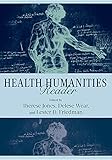Health humanities reader /edited by Therese Jones, Delese Wear, and Lester D. Friedman ; assistant editor Kathleen Pachucki.
Material type: TextPublication details: New Brunswick, New Jersey : Rutgers University Press, (c)2014.Description: 1 online resource (xiii, 603 pages)Content type:
TextPublication details: New Brunswick, New Jersey : Rutgers University Press, (c)2014.Description: 1 online resource (xiii, 603 pages)Content type: - text
- computer
- online resource
- 9780813562483
- R723 .H435 2014
- COPYRIGHT NOT covered - Click this link to request copyright permission: https://lib.ciu.edu/copyright-request-form
| Item type | Current library | Collection | Call number | URL | Status | Date due | Barcode | |
|---|---|---|---|---|---|---|---|---|
 Online Book (LOGIN USING YOUR MY CIU LOGIN AND PASSWORD)
Online Book (LOGIN USING YOUR MY CIU LOGIN AND PASSWORD)
|
G. Allen Fleece Library ONLINE | Non-fiction | R723 (Browse shelf(Opens below)) | Link to resource | Available | ocn892910505 |
Browsing G. Allen Fleece Library shelves, Shelving location: ONLINE, Collection: Non-fiction Close shelf browser (Hides shelf browser)
Includes bibliographies and index.
Title Page ; Copyright ; Contents; Foreword; Acknowledgments; Introduction; Part I. Disease and Illness; 1. Being a Good Story; 2. Illuminating the It, Thee, and We of Disease and Illness; 3. "This Weird, Incurable Disease"; 4. My Quest for Health; Part II. Disability; 5. Disability in Two Doctor Stories; 6. Music and Disability; 7. American Narrative Films and Disability; 8. Standout; Part III. Death and Dying; 9. When the Doctor Is Not God; 10. Postmodern Death and Dying; 11. Second Degree Block; Part IV. Patient-Professional Relationships12. Social Studies; 13. Humanities and the Medical Home; 14. Occupational Medicine; Part V. The Body; 15. The Virtues of the Imperfect Body; 16. Seeing Bodies in Pain; 17. Public Fetuses; 18. More Body; Part VI. Gender and Sexuality; 19. Adult Intake Form; 20. What Is Sex For? or, The Many Uses of the Vag; 21. "I Always Prefer the Scissors"; 22. Comics in the Health Humanities; 23. I Am Gula, Hear Me Roar; Part VII: Race and Class; 24. Listening as Freedom.
25. Race and Mental Health; 26. Law's Hand in Race, Class, and Health Inequities; 27. The Rooms of Our Souls; Part VIII. Aging; 28. "Old Age Isn't a Battle, It's a Massacre"; 29. "Do You Remember Me?"; 30. Love in the Time of Dementia; Part IX. Mental Illness; 31. Narrating Our Sadness, with a Little Help from the Humanities; 32. Teaching Narratives of Mental Illness; 33. Community Psychiatry and the Medical Humanities; 34. Culpability; Part X. Spirituality and Religion; 35. Rites of Bioethics; 36. Health and Humanities; 37. Scientia Mortis and the Ars MoriendiChapter 38: Meditations of an Anesthesiologist; Part XI: Science and Technology; Chapter 39: Andromeda's Futures; 40. Knowing and Seeing; 41. A Brief History of Love; Chapter 42: Calcedonies; Part XII: Health Professions Education; 43. Teaching Autism through Naturalized Narrative Ethics; 44. Courting Discomfort in an Undergraduate Health Humanities Classroom; 45. The Medical Humanities in Medical Education; 46. In Defense of Cheaper Stethoscopes; References; Notes on Contributors; Index.
Over the past forty years, the health humanities, previously called the medical humanities, has emerged as one of the most exciting fields for interdisciplinary scholarship, advancing humanistic inquiry into bioethics, human rights, health care, and the uses of technology. It has also helped inspire medical practitioners to engage in deeper reflection about the human elements of their practice. In Health Humanities Reader, editors Therese Jones, Delese Wear, and Lester D. Friedman have assembled fifty-four leading scholars, educators, artists, and clinicians to survey the rich body of work that.
COPYRIGHT NOT covered - Click this link to request copyright permission:
There are no comments on this title.







